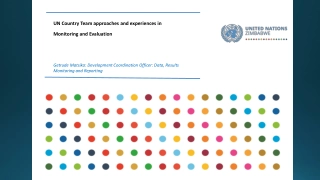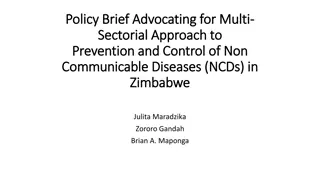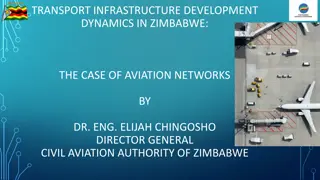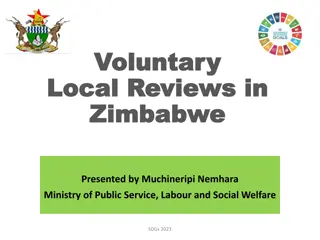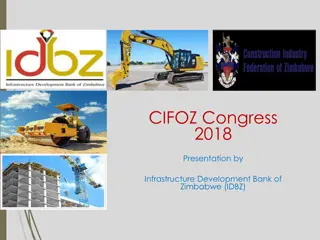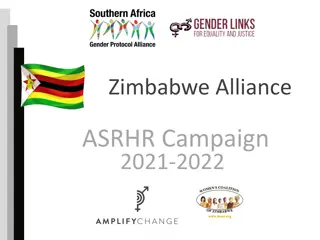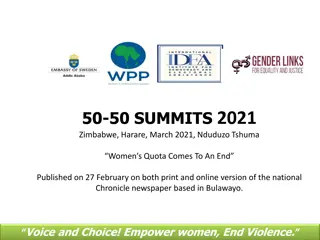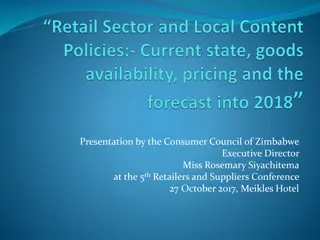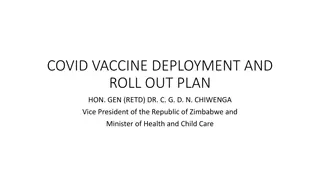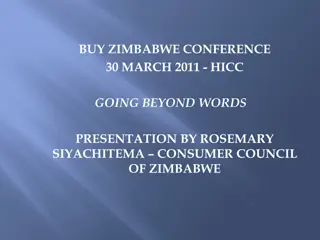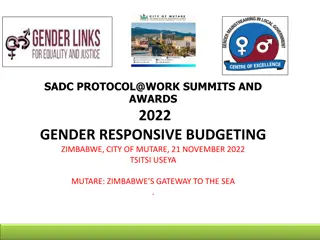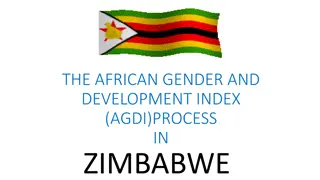Development Agenda for Zimbabwe: Addressing Key Fundamentals of Life
Zimbabwe, located in southern Africa, is rich in minerals and investment potential. The evolution of citizens has led to the establishment of international and regional institutions to address their needs. Global development plans prioritize areas such as economic growth, food security, health, infrastructure, and governance. The focus is on eradicating hunger and poverty, ensuring peace and security, promoting gender equality, and addressing environmental challenges. Zimbabwe's development agenda covers a range of sectors to enhance the country's overall well-being and sustainability.
Download Presentation

Please find below an Image/Link to download the presentation.
The content on the website is provided AS IS for your information and personal use only. It may not be sold, licensed, or shared on other websites without obtaining consent from the author. Download presentation by click this link. If you encounter any issues during the download, it is possible that the publisher has removed the file from their server.
E N D
Presentation Transcript
PREPARED BY Mr T. CHAPARADZA: ZIMBABWE
Let me start by introducing Zimbabwe and Africa for ease of following my presentation Zimbabwe is found in southern part of Africa next to South Africa It has a population of 15 178 979 and measuring 390 760 square km Zimbabwe is endowed with 40 different minerals and offers great investment potential in mining, agriculture, tourism, construction and many more
Citizens evolved over time from Medieval Stone Age to Industrialization Age Enlightened citizens and put pressure for service delivery and accountability by Governments (Depletion of Natural Resources) Hierarchy of Citizens and pressure organisations emerged to oversight their interests Birth of international, continental , regional and domestic institutions to address the citizen needs and wants Development Planning and Management of Development Results became a common agenda in public discourse
Global, continental, regional and national development plans came into being Targets were set at each level to guide nations and create unity of direction for governments Development Results Frameworks at appropriate levels were crafted All efforts were unanimously agreed to be targeted at key fundamentals of life to the likes of
Hunger and poverty eradication Peace and security Women, gender and children Food and nutritional security Governance Environment Education Health Climatic Change and Disasters etc
1. Economic Growth and Stability 2. Food and Nutrition Security 3. Moving up the value chain & Economic Transformation 4. Health and Wellbeing 5. Infrastructure and utilities 6. Housing Delivery 7. Image Building & International Engagement & Re-engagement 8. Governance 9. Human Capital Development 10. Environmental Protection, Climatic Resilience & Natural Resource Mgt 11. Social Protection 12. Digital Economy 13. Devolution 14. Youth, Sport and Culture
Evaluation by simple definition is reflecting whether our performance is addressing the citizens felt state of deprivation or exposure The best OUT of evaluation can only be realised when its robust enough to bring the CITIZEN at the centre of development planning and provides feedback from the citizen comprehensively to guide planners, executors of policies, programmes and projects and the evidence-based decision makers
A robust evaluation policy does not come by itself , there are key fundamentals to consider such as : a) Enabling Environment will at the highest levels to accept and embrace evaluations. Once evaluations are misconstrued and abused as instruments to pursue and expose key politicians , resistance becomes natural There should be some guidelines to go with the evaluation policy spelling out the details of formats, procedures, reporting flow and dispensing of the evaluation There should a A National Development Plan informed by International, Continental, Regional and National Development Results Frameworks Enabling Environment- - There should be a political
The Development Results Frameworks are results chains with performance targets imbedded in them There exists some Key Performance Indicators ( KPIs) to track them and generate reports to give update The KPIs should be measurable and citizen centric
b) Institutional capacity building without proper institutional arrangements may not secure traction and resounding support A readiness assessment is critical to make sure the institutions have what it takes to sustain an evaluations led Government It is critical to think on official data providing institution, else data without credibility spoils all the cause to effect a robust evaluation Institutional capacity building- - Evaluations
In Zimbabwe, there is ZimStats which is mandated to provide basic information across sectors. They champion The Zimbabwe National Statistical Strategy The issue of data instrumentalization is pivotal , as secondary data is critical in conducting evaluations by providing baseline information and data validation
c) Personnel Skills assessment in order to ensure that there is smooth implementation and making use of evaluation findings besides deducing lessons learnt out of them Skills to the likes of availing of potential areas for evaluation for consideration of Cabinet, which advises on areas it needs evidence based information for its use The above is better referred to as Annual National Evaluation Work Plan-its developed from submissions from line ministries on key areas they want to evaluate in the coming fiscal year and consolidated for submission to cabinet Personnel Skills The staff skills need
Was launched in 2015 to drive IRBM Aimed to foster a results oriented performance culture in Government To harmonize the pursuit of international and regional commitments to the likes of SDGs and Africa Agenda 2063 and SADC Industrialization Policy Chapter 2 , Section 9 (1) of the Constitution of Zimbabwe allowed the State to adopt policies that fosters efficiency, accountability, competence, transparency at every level of Government as citizens continue to demand quality service delivery
Was developed after a series of workshops with participants drawn from public service, parastatals, development partners, academia, civil society and many more Purpose of the policy was to guide the implementation of government policies, programmes and projects in order to achieve effective and efficient service delivery Provides definitions, norms and standards for conduction an evaluation as well as governance and accountability standards
Calls for all gvt departments to embrace IRBM Makes it mandatory to continuously monitor and evaluate implemented gvt policies, strategies, programmes and projects at least once its life time Requires Evaluation Plans to be done in compliance with set standards and procedures Spells out evaluation coverage ( each level of the results chain has to be covered)
Its the Medium Term Plan for Vision 2030 It is comprised of 14 TWGs, each has a chairperson at the level of a Permanent Secretary Each has set national targets( National Priority Areas) to pursue and report on TWGs are supposed to meet quarterly to produce Reports for the National Joint Review Committee and Cabinet The data generated from the TWGs as they report on their targets is informed by an annually drawn M & E framework is inputted into an electronic monitoring systems to generate electronic reports.
The above concept was embraced by the Government in an effort to ensure all government entities are operating at the highest level of efficiency possible. Traditionally the M & E was restricted to Admin, Finance and HR issues ignoring the programming/line function where the real service delivery happens At the centre of Whole of Gvt Approach lies the Tripartite comprised of OPC, Ministry of Finance and Economic Development and Public Service Commission They all work jointly to ensure smooth functioning of Government An IRBM Approach was adopted were all Ministries, Departments and Agencies submit their Annual Strategic Plans and Performance Update Reports to the tripartite
The Tripartite deliberate on the Reports before sending them up to the National Monitoring Steering Committee. All Ministries, Departments and Parastatals Heads signed Performance Contracts and appraised annually Best performers are rewarded
Policy compliance particularly allocating 3% of budget to Evaluations or 10% to M& E by Ministries is yet to happen Competent staff to drive the cause are still thin on the ground Continuous staff movements The culture of utilizing Evaluation Findings need to be improved Some TWGs continue to operate in silos Evaluations are not for witch-hunting and is not similar to auditing function
Data availability in some areas remains a challenge Some KPIs are complex and difficult to measure besides having them outward looking Lack of adequate tools of trade and reliable connectivity network
Availing resources for evaluation led governance Improving the utilisation of evaluation findings to inform future programming Storage of Evaluation findings for future reference Developing bankable evaluations that clearly pursue a well defined development agenda Establishing permanent structures for evaluations support
Fostered unity of Direction and effective policy analysis and review Assured Citizens of our efforts to deliver Created a results orientated performance culture It forced us to plan Reduced risks of not meeting targets Timely corrective action on areas not performing well Exposes poorly performing areas and attributing factors
Have promoted transparency and accountability Allowed continuous reflection on whether things are being done right and answered whether there is still coherence with the Citizen targeted Availed answers for many issues raised in public discourse
Evaluations availed comprehensive, reliable and timely data concerning a selected area of focus by Cabinet, which will then decide or appreciate the impact for a pursued policy, programme or project even feedback on general public service delivery. Allowed us to get the VOICE of the beneficiaries and their recommendation. Evaluations have brought with them a lot of learning and knowledge construction for diverse clintele
The role of Evaluations in the post Covid-era where Governments are focused on reviving their battered economies, supply chains, programmes and projects cannot be overemphasized The Covid global pandemic brought with it appallingly great dynamics in policies, programmes and projects programming Evaluations led Governments stands great chances of durable citizenry support and longevity in power
Evaluations remain the spine of checking whether planned goals and objectives are being achieved The effectiveness of all interventions is better addressed by evaluations The pursuit of SDGs and Vision 2030 resides in effective Evaluations by Governments No Evaluation , No Learning and No Evidence
THANK YOU ALL BE REMEMBERED


